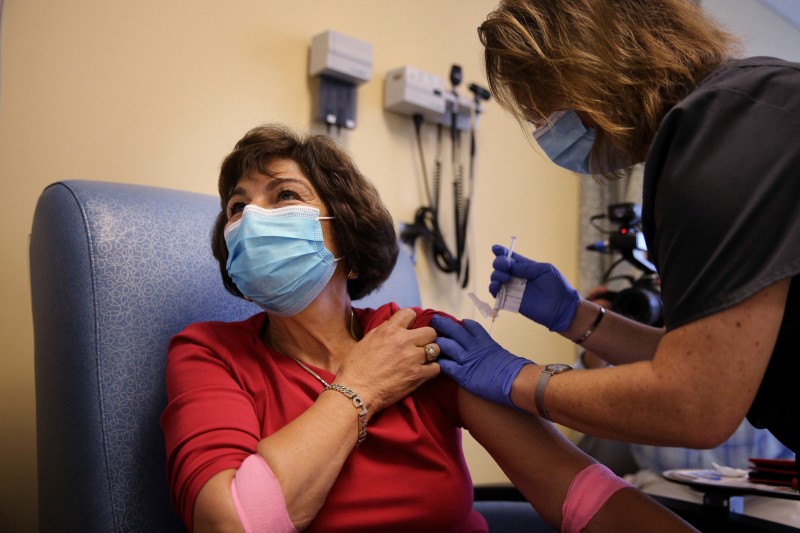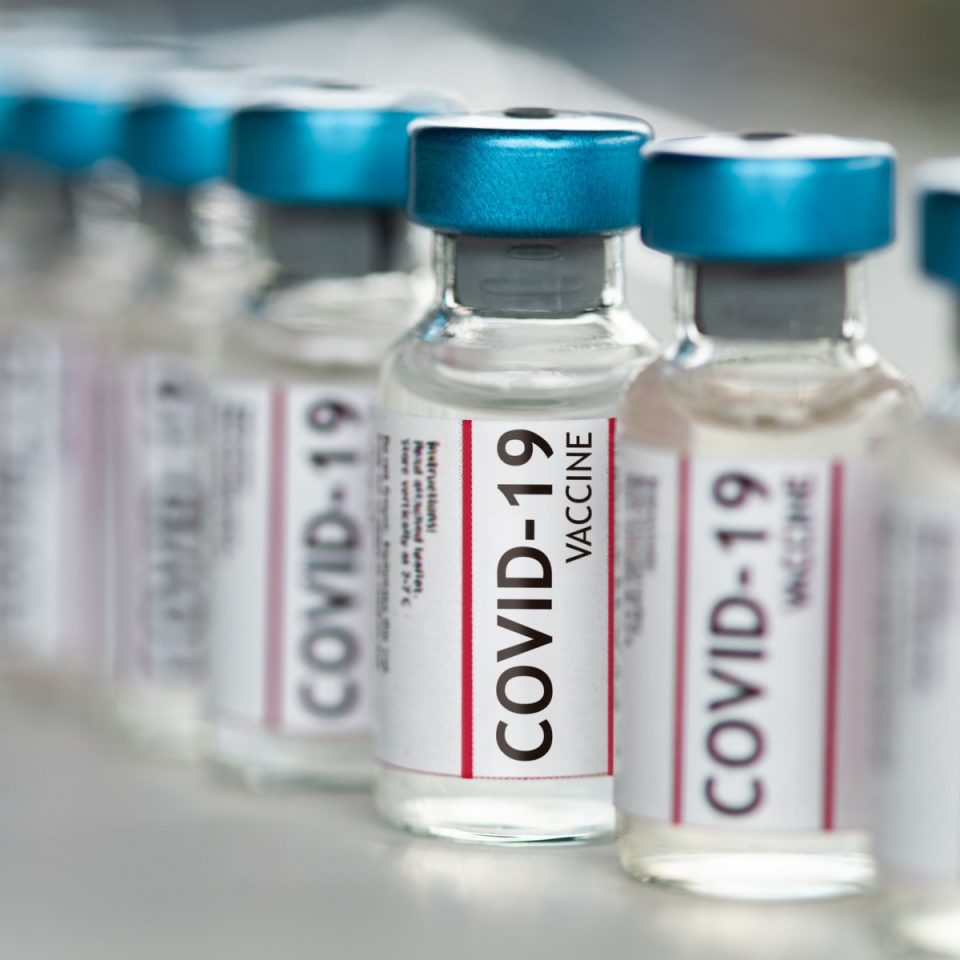- North Carolina has begun administering its first 85,800 doses of the COVID-19 vaccine produced by Pfizer and BioNTech, with another 61,000 doses expected to arrive this week. The first 175,000 doses of the Moderna vaccine are also expected to arrive this week. Both vaccines have been granted emergency use authorization (EUA) by the Food and Drug Administration (FDA). This process is designed to fast-track medicines to treat or prevent life-threatening diseases in public health emergencies.
- The first vaccines are earmarked for health care workers at high risk for exposure to COVID-19 and long-term care residents and staff.
- Adults age 65 and over are currently included in Phase 2, behind Phase 1a and 1b, in the state’s vaccination rollout plan, but it is unclear when vaccines will be available to this group.
- Vaccine news is changing quickly. Check this guide for updates in days ahead.

Boston Globe/Boston Globe via Getty Images
When can older adults get the vaccine?
Probably not until early next year. Because initial supplies of the vaccines are limited, doses are being allocated and administered via a multiphase distribution plan. “We will continue to have very limited vaccines supplies at first,” said Mandy Cohen, secretary of the North Carolina Department of Health and Human Services (NCDHHS), in a press conference, noting that it will take months for the vaccines to be widely available to all of North Carolina’s almost 10.5 million residents. “We’re going to work through priority populations that have higher risk of exposure or higher risk of getting very, very ill from COVID,” she said. “Then we’ll move into other populations.”
Following recommendations from the Centers for Disease Control and Prevention (CDC), Phase 1a of the plan includes health care workers at high risk for exposure to COVID-19 and long-term care residents and staff. Phase 1b includes adults with two or more chronic conditions, essential frontline workers at high risk of exposure, and those working in prisons, jails and homeless shelters. Phase 2 includes adults age 65 and over, adults under 65 with one chronic condition that puts them at severe risk of illness, essential frontline workers, health care workers, and those living in prisons, homeless shelters or migrant and fishery housing.
The CDC’s independent advisory panel has recommended that adults age 75 and older be in Phase 1b and that adults ages 65 to 74 be in Phase 1c. North Carolina is currently reviewing the CDC’s recommendations and updating its vaccination rollout plan.
With an estimated 727,000 to 951,000 people in its Phase 1b populations, it may be at least another few weeks before older North Carolinas are eligible for their vaccines, based on the state’s interim COVID-19 Vaccination Plan.
How do I know when I’m able to get a vaccine?
AARP recommends that you talk to your doctor about the safety, effectiveness, benefits and risks of the COVID-19 vaccine. Older adults, especially those with underlying medical conditions like heart disease and diabetes, are at increased risk for hospitalization and death from COVID-19.
Follow updates about the vaccine’s availability for various groups on the state Department of Health and Human Services COVID-19 vaccine information page.
I’ve heard that some vaccines require a second shot.
The initial COVID-19 vaccines from Pfizer and Moderna require two doses. If you get one of these vaccines, you’ll need a follow-up dose a few weeks later to be effectively immunized.
“What you have is you get some degree, not optimal, but some degree of immunity a couple of weeks after the first dose,” Anthony Fauci, director of the National Institute of Allergy and Infectious Diseases, said in December. “That’s not optimal. After the second dose, you get optimal immunity anywhere from seven to 10 days after the second dose.”
After receiving the first dose of a COVID-19 vaccine, recipients should get a card from their provider saying which vaccine they received and the date of their shot. The providers should also give information on when and where to return for a second dose and may ask recipients to book that second appointment. Providers may also send out reminders regarding second doses. The state is also tracking vaccinations via a secure data system, called the COVID-19 Vaccine Management System (CVMS), which will send email reminders for second doses.
The CDC has also launched a web tool called v-safe that lets you sign up for text message reminders for your second vaccine appointment and report possible side effects.
Where can I get a vaccine?
Currently, vaccines are going to hospitals, local health departments and long-term care facilities for Phase 1a priority populations.
Once the vaccine supply increases, North Carolina plans to expand the network to include primary and specialty care providers, local public health agencies, pharmacies, providers serving incarcerated populations, mobile vaccination providers, occupational health providers and others.
How will nursing home and other long-term care residents get the vaccine?
The federal government has contracted with CVS and Walgreens to administer the COVID-19 vaccines at no cost to long-term care residents and staff. The two national drugstore chains say that more than 48,000 of the 50,000 skilled nursing and assisted living communities in the U.S. are participating in the program. North Carolina will vaccinate its long-term care residents and staff through the program, with the Moderna vaccines, starting the week of Dec. 28.
Do I have to pay for the vaccination?
AARP fought to make sure the federal government is covering the cost of the vaccine itself. But the CDC says vaccine providers may still charge a fee for giving someone a shot. The Centers for Medicare & Medicaid Services has said the vaccine will be administered free of charge to Medicare beneficiaries, with no copays. Some health insurance companies have also announced that there won’t be out-of-pocket costs for policyholders.
There are already reports of scammers purporting to offer COVID vaccines and treatments and trying to charge for them. AARP’s Fraud Watch Network is tracking the latest scams.
How long does immunity last after I get vaccinated?
It’s not yet known how long immunity from a coronavirus vaccine lasts and whether it needs to be administered on a regular basis like the flu shot.
Should I still wear a mask after getting vaccinated?
Yes. Experts still need to learn more about the protection the vaccines provide under “real-life conditions,” the CDC says. It could take your body a few weeks to build up immunity after the second dose of a vaccine. And while the Pfizer and Moderna vaccines are effective at preventing symptoms of COVID-19, it’s not yet clear whether someone who’s been vaccinated can still catch the virus and transmit it to others.
The vaccine is just one tool that can help slow the spread of the coronavirus. The CDC says it could take months for the population to build up immunity and continues to recommend preventive measures such as face masks and social distancing.
“Seeing vaccinations underway gives us hope at the end of a hard year, but this virus continues to be extremely contagious and deadly,” North Carolina Gov. Roy Cooper said in a press conference. “We need to persevere and keep using our tried-and-true safety precautions: Follow the modified stay-at-home order, care for your neighbors and loved ones by wearing a mask, keep distance between you and others. The more careful we are now, the more lives we will save.”
AARP has also called for ongoing monitoring of vaccines, once they are authorized for public use, to identify any risks that weren’t evident in the expedited development and review process.
Also of Interest:


